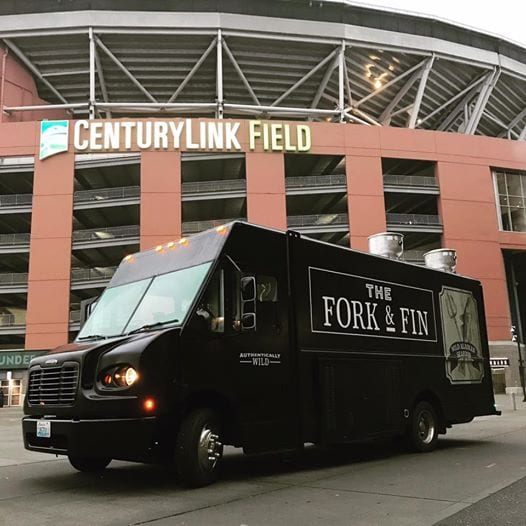
Alaska pollock is the nation’s largest food fishery, usually producing more than three billion pounds each year. The flaky whitefish dominates in fish sticks, fast food sandwiches and surimi “seafood salad” blends – but most Americans don’t even know what a pollock is.
Trident Seafoods is intent on changing that by bringing the fish directly to the people.
“It is the most abundant, certified sustainable species in the world. It’s our mission to show how this delicious, cousin to the cod fish can be enjoyed one serving at a time,” said Lo Reichert, Trident’s mobile marketing manager of the Fork and Fin, a retrofitted FedEx truck turned into a flashy mobile kitchen.
The truck debuted a few weeks ago at Sea Hawks games outside of CenturyLink Field in Seattle.
“We wanted a mechanism to go from sea to street and let us talk with people about the blessings of wild Alaskan seafood, and particularly, Alaska pollock,” he added.
The small menu, priced at $9 to $10, includes fish and chips with Alaskan Amber beer batter, pollock burgers, crispy fish tacos, grilled Alaska pollock salad and one offbeat offering – peanut butter and jelly fish sticks.
“It has fish sticks laid atop crispy fries, drizzled with a raspberry chipotle sauce and topped with crushed peanuts and a peanut sauce,” Reichert explained.
The ultimate goal, he added, is to show people that they can easily whip up popular pollock meals at home. Reichert said the response has been wonderfully consistent.
“They say wow, I just tried this fish and it tastes very similar to cod. It’s delicious and it’s something I can make for my family,” he said.

Salmon ballot push
A statewide petition is gathering up to 45,000 signatures to put the salmon habitat protection issue before the voters next November.
“We have volunteers collecting signatures from Nome to Sitka,” said Ryan Schryzer, director of Stand for Salmon, a grassroots group that is the primary backer of the initiative.
“I’ve been blown away by the response from volunteers who are fired up about collecting signatures. We had hundreds of books go out almost immediately,” he added.
Schryzer said getting signatures from Alaskans is an easy sell.
“When our volunteers talk about this initiative helping to put the standards in place that will encourage responsible resource development and protect salmon for future generations, people are all in and sign very quickly,” he said.
The deadline to submit the petitions to the Division of Elections is Jan. 15 at the start of the legislative session.
Find more on the ballot initiative at info@standforsalmon.org
Fish in court
A California man has filed a class action lawsuit in San Diego against Bumble Bee Foods claiming its canned smoked red salmon is falsely labeled as wild-caught from Alaska and not smoked at all.
Undercurrent News reports that the suit says the fish is actually farm raised coho from Chile with red color added along with smoked flavoring. It alleges that Bumble Bee is violating state marketing laws on false advertising and consumer protections.
In the red flag from afar arena
The Center for Biological Diversity has filed a formal notice of intent to sue the Trump Administration for allowing oil companies to dump unlimited amounts of wastes from fracking and drilling into the Gulf of Mexico.
In September, Trump’s Environmental Protection Agency OK-ed new and existing permits to dump unlimited amounts of chemical-laden waste fluids into the Gulf. That adds up to more than 75 billion gallons a year.
The filing claims the EPA has failed to conduct any meaningful review of the environmental impacts to marine species of dumping fracking waste into the water, a violation of the federal Endangered Species Act. Common fracking chemicals are proven to be among the most toxic in the world to marine animals.
In October Trump announced plans to auction off more than 76 million acres of Gulf of Mexico waters to oil companies. That lease sale, scheduled for March 2018, will be the largest oil sale in U.S. history and includes federal waters off the coasts of Texas, Louisiana, Mississippi, Alabama and Florida.
Fish correction
The Recreational Quota Entity program, should it get final approval by federal managers, will provide an opportunity for halibut charter operators to purchase catch shares, but it will not automatically increase charter catches. The charter limits would go down by the same percentage as commercial fishing limits. Should the RQE program be implemented, it would begin in 2019 and not 2018.














